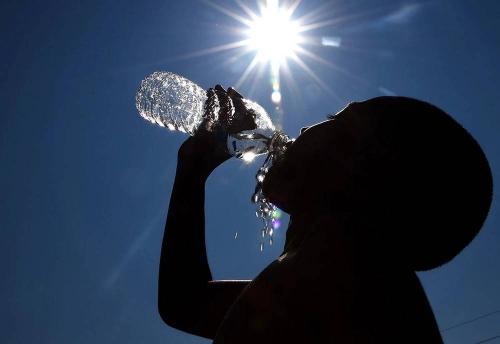Prepare for long and intense heat!
Mohammed Darwish
TDT | Manama
The Daily Tribune - www.newsofbahrain.com
For many Bahrainis, summer is a season of contrasts, bringing the delight of long, sun-filled days and the freedom of school holidays, alongside the challenge of enduring intense heat that tests both physical and mental resilience. This year promises to be particularly taxing, with temperatures already soaring in the weeks leading up to its official start.
As the sun reached its peak yesterday, marking the beginning of astronomical summer, Bahrainis prepare for a season that will push their endurance to the limit. Recent days have seen a significant rise in temperatures as Bahrain braces for the official start of summer, which began yesterday, at 11:50 p.m. local time.
Yesterday’s maximum temperature hit 46 degrees centigrade (114 F), exceeding the 45 degrees forecasted by weather websites. The high temperatures were accompanied by rising humidity, which surpassed 80% yesterday and is expected to climb further, reaching over 85% tomorrow, along with a temperature of 44 degrees centigrade. Temperatures are predicted to continue rising in the coming days, with Sunday’s high expected to reach 45 degrees centigrade.
Longest season
Astronomy researcher Mohammed Redha Al-Asfour explained that summer is the longest season in the Northern Hemisphere, lasting 93 days, 15 hours, and 52 minutes. He noted that yesterday marked the astronomical peak of summer, featuring the longest day and shortest night of the year.
During this period, daylight hours will gradually decrease, while in the Southern Hemisphere, this day marks the peak of winter, characterized by the shortest day and longest night.
Night hours will also begin to gradually decrease. On the first day of summer in Bahrain, the sun rose at 4:45 a.m. from the farthest point of the northeast and set at 6:32 p.m. from the farthest point of the northwest. Midday occurred at exactly 11:39 a.m., marking the longest daylight period of 13 hours and 47 minutes and the shortest nighttime period of 10 hours and 13 minutes of the year.
Climate change
Much of the extreme heat is attributable to the impact of climate change, but El Niño has also been a factor. Experts predict a scorching summer across the Middle East and North Africa this year. Over 290 million people will endure extreme heat, exacerbated by human-induced climate change.
Louise Baker, managing director of the global mechanism at the United Nations Convention to Combat Desertification (UNCCD), highlighted global desertification rates, with 100 million hectares lost annually. In the Middle East, water scarcity and drought pose severe challenges, particularly affecting agriculture.
Interestingly, scientists from Australia’s Monash University, China’s Shandong University and the London School of Hygiene and Tropical Medicine found that the Middle East has been hit the hardest by a rise in global heatwave deaths over the past three decades.
Related Posts

